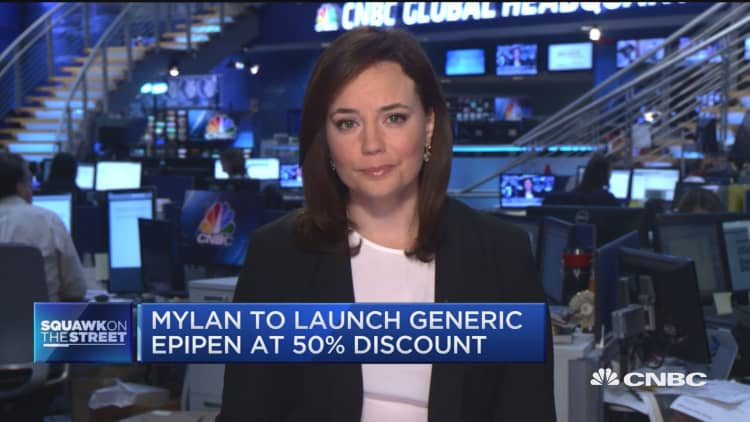
Mylan's unusual decision to introduce an identical, generic EpiPen competitor follows a week of pressure to lower the price of its lifesaving allergy drug — but some are now questioning whether the move, designed to appear as a price-lowering measure, may in fact net Mylan more revenue than the original version.
The generic version of EpiPen will have a list price of $300 for a two-pack, about half that of the branded EpiPen, Mylan said Monday. It'll be "AB-rated," meaning pharmacists can automatically swap in the generic version for the brand.
But wait: Last week, Mylan broke out the economics of the branded EpiPen supply chain. Out of the $608 list price, it said it nets just $274 per EpiPen 2-Pak, after rebates to pharmacy benefits managers and cuts taken by others in the chain, such as distributors and pharmacies.
So if the generic has a list price of $300, and Mylan doesn't need pay out as much to the rest of the supply chain, what will the net price be of generic EpiPen?
Mylan declined to comment. But that is a key question analysts and investors are now puzzling over.
"It's clever," American Enterprise Institute fellow Dr. Scott Gottlieb said in an e-mail Monday. It "lets them reset the price and not rebate on the 'generic.' They could actually end up making more net money per unit on the generic."
Others disagree. In a note Monday morning, analyst Ronny Gal at Bernstein estimated the result of both the EpiPen generic and patient assistance measures Mylan announced last week would be a 25 percent reduction in revenue per EpiPen prescription.
Regardless, Gal saw the move as smart, "and real," he said.
"The two steps taken by Mylan to reduce the cost of EpiPen will have material impact on the consumer cost of the drug," Gal wrote. Further, he said they should allay investor concerns.
"There is some loss of revenue here, but given stock reaction (which takes EpiPen essentially out of the stock) anything which will help alleviate the broader pressure should help the stock," Gal said.
Earlier Monday, Mylan CEO Heather Bresch called the introduction of a generic EpiPen "an extraordinary commercial response."
"Because of the complexity and opaqueness of today's branded pharmaceutical supply chain and the increased shifting of costs to patients as a result of high deductible health plans, we determined that bypassing the brand system in this case and offering an additional alternative was the best option," she said in a statement.
"Bypassing the brand system" refers to the defense Bresch made last week. She told CNBC that the branded pharmaceutical system in the U.S. — whose players span pharmacy benefits managers, distributors, retail pharmacies and insurers — incentivizes higher drug prices. So by Mylan, primarily a generics company, introducing its own generic, it says it's bypassing that system.
Companies often prepare "authorized generic" versions of their own branded drugs when anticipating generic competitors; what's unique in this situation is that there is no identical generic competitor to the EpiPen (Impax Labs' Adrenaclick is another version of an epinephrine auto-injector, but it's not AB-rated, so it can't be automatically swapped by pharmacists).
Teva Pharmaceutical has been developing a generic competitor so similar it could be automatically swapped in by pharmacists. But it was rejected by the FDA earlier this year. With the move to introduce its own generic, Mylan takes the market not just on branded EpiPen, but also its generic competitors.

